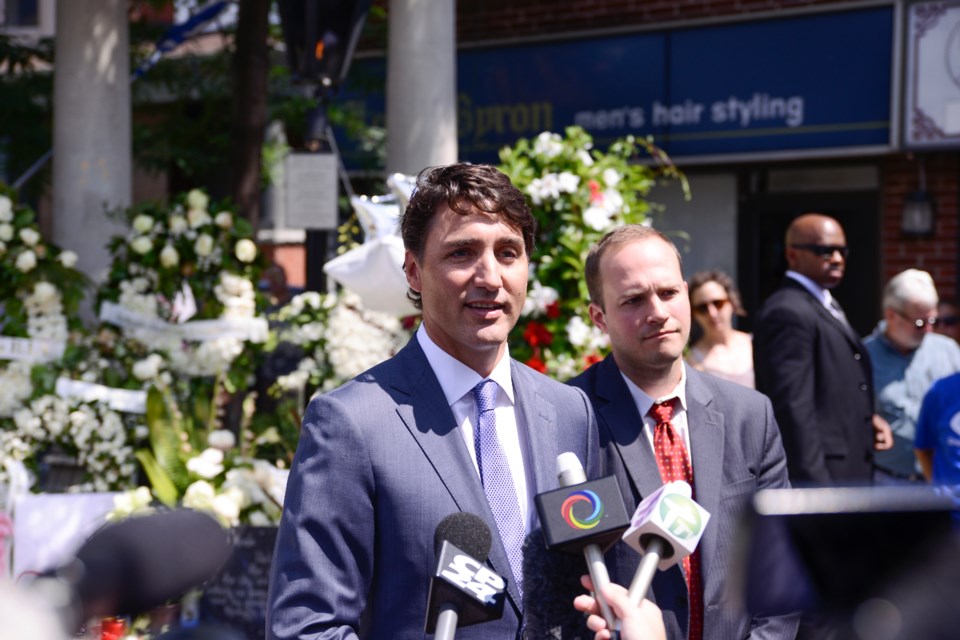It’s something political scientists prefer not to talk about, but a significant piece of politics is stagecraft. Illusion – politicians giving the masses a narrative, or story, to garner support.
For Justin Trudeau’s federal Liberals, the story of another election victory is so far going about as well as their story that a budget can balance itself.
At the heights of Trudeau’s personal popularity, we’d see front page photos of him jogging, or happening onto weddings or proms. His team got swept up in these photo-ops, resulting in his disastrous trip to India, where his costumed efforts did not go over well.
The idea of pleasing both sides on the pipeline debate turned into an economic disaster; taxpayers are now on the hook for what the private sector would have built for free.
Mismanagement of the economy and the increasing deficits and debt have forced Liberals to shift the burden of taxes on to small businesses and Canadian families. The narrative of carbon tax as climate change strategy is also failing: Canadians are realizing that a tax is a tax, which takes money from their pockets and puts it in the coffers of the government treasury.
Now the illusion is support for the media industry.
Instead of innovative ideas like pushing media CEOs into accept the new reality of the digital age, opening the CBC’s content to all outlets free of charge, or simply allowing the free market to take its course, the Liberal government offered a $600 million bribe, hoping for a friendly narrative in an election year.
This puts the media in an awkward position, as seen in the avalanche of columns denouncing the move. But the Liberals need a friendly media to write a narrative of smokescreen and illusions.
This is not the first time that the government of Canada has offered money to lure the media. However, earlier attempts were masked by investigating the concentration of Canada’s media through commissions. Two were set up by Justin Trudeau’s father: the Davey commission (1969) in his first term; and the Kent commission (1980) in his last.
While the stated purpose of both was to study the impact of growing concentration of media ownership, Pierre Trudeau’s indirect objective was to bring media independence under government control.
Senator Kent recommended tax credits to help the media. However, just like the Davey Commission, it also recommended the creation of the Press Rights Panel reporting to Parliament. This was an indirect attempt to bring media under government control with tax dollars.
The publishers and journalists realized that if it were to remain the “fourth pillar of democracy,” media must remain apart – or at least arms-length – from government. As a result, they were not only united in rejecting government offers of money through tax credits, but also its attempts to control them through a Press Rights Panel.
A vibrant democracy requires an independent voice in the form of media. Modern mass communication has opened vast opportunities for competing voices on a variety of governmental and non-governmental issues.
The emergence of social media has made these voices louder and more diverse. The unorganized nature of social media, however, calls for strengthening the voices of professional publications with trained journalists. Journalists’ own set of ethics and industry’s ethical guidelines (along with the judicial branch to enforce liability laws) still makes it an integral part of a healthy democracy.
Justin Trudeau has shown his distaste for diversity of views on more than one occasion. After taking over as party leader, he issued an order that a person with pro-life views cannot be a Liberal candidate. This year, he forced his views on the funding projects for summer student jobs program by declaring unless organizations and associations attest to his values, they will not receive government funds.
One wonders if that was a glimpse into the media’s future.
Needless to say, the narrative to cover his government’s economic failures and the desire to impose his values on everyone requires a friendly narrative. Unlike in the past, this time most Canadian publishers and journalists seem willing to accept government money.
They maintain they won’t be compromised with government money – but Justin Trudeau’s team is confident that he who pays the piper, calls the tune.
Dr. Shinder Purewal is a professor of political science at Kwantlen Polytechnic University, a regular political commentator, and the author of two books, Tandoori Democracy and Sikh Ethnonationalism and the Political Economy of Punjab. He lives in Surrey.



